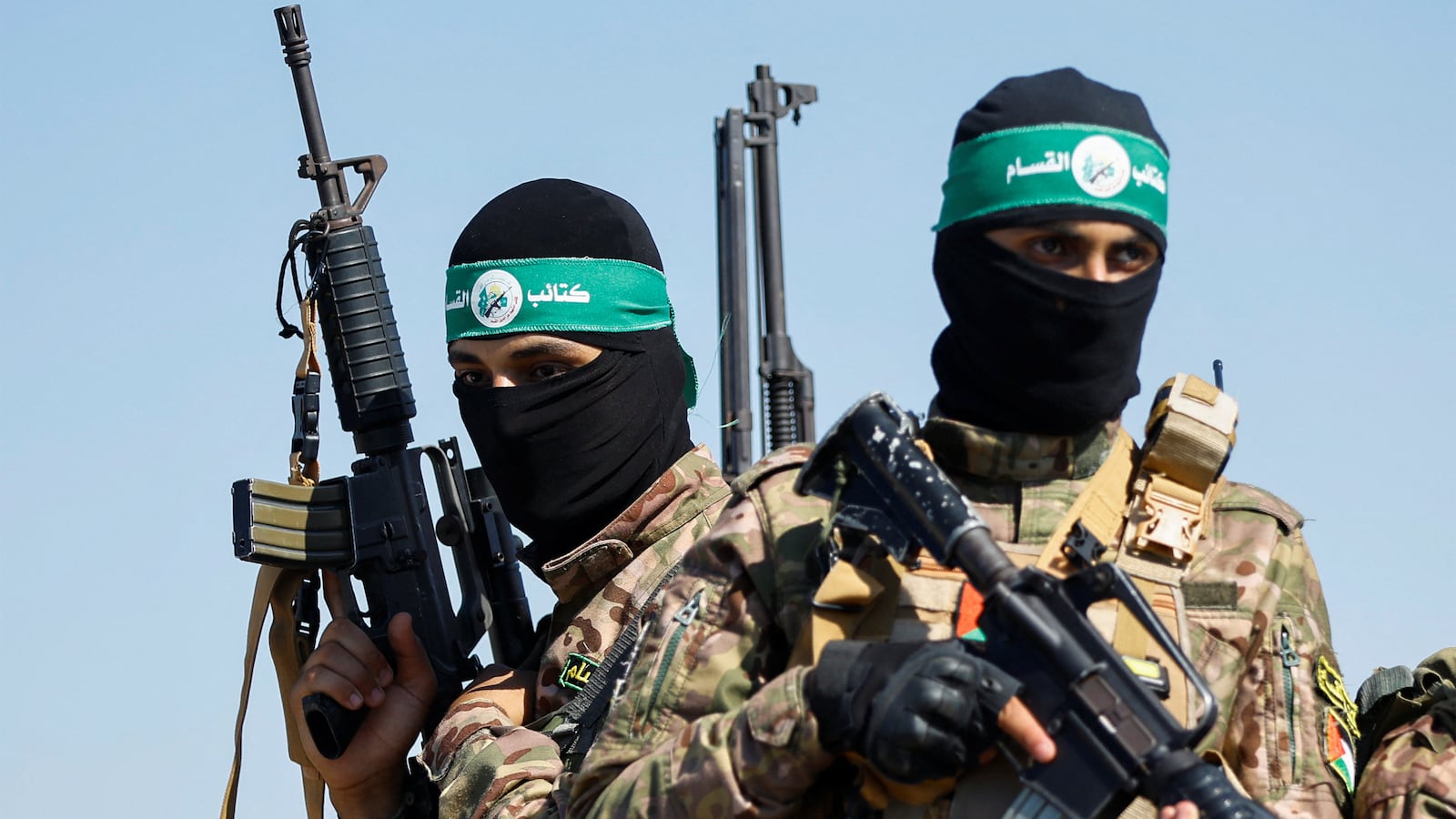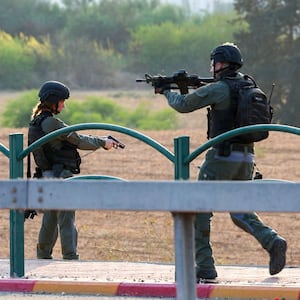On Friday, October 6, the Palestinian militant group Hamas launched a daring, brutal and highly effective attack on southern Israel. Easily breaching supposedly impenetrable Israeli defenses and encountering little Israeli military resistance, Hamas beseiged numerous communities and killed at least 800 Israelis, most of them civilians. They spirited dozens of military prisoners and civilian hostages into Gaza on motorcycles, in golf carts and even on foot. It was the most devastating surprise assault in Israel in over 50 years and unprecedented in its impact on its sense of stability and security.
Hamas is the paramilitary wing of the Muslim Brotherhood among Palestinians, formed in 1987 as grassroots Palestinian organizations led a spontaneous uprising against Israeli occupation that focused on protests and stone-throwing. In contrast to that grassroots uprising and the diplomatic strategy of the Palestine Liberation Organization (PLO) that had already decided to seek a two-state peace agreement with Israel, the Brotherhood in Gaza created Hamas to pursue a religiously-sanctioned armed struggle against Israel.
Hamas proved popular in Gaza, which had been highly influenced by the Muslim Brotherhood during Egypt’s rule of the Strip between 1948-1967. Cairo had allowed some Egyptian Muslim Brothers to operate in the Palestinian territory it controlled as a kind of safety valve while cracking down on it inside Egypt itself. So, the cultural groundwork for Hamas’ militancy and socially reactionary political agenda already existed inside Gaza. But it proved a harder sell among Palestinians more broadly.
Hamas quickly discovered that it could strengthen its political foothold among Palestinians by yoking its non-compelling social agenda with an uncompromising armed struggle against Israel. As the PLO’s diplomatic agenda appeared to bear fruit with the 1993 Oslo Accords and with the establishment of Palestinian self-rule in populated enclaves of the West Bank and in Gaza, Hamas increasingly turned to violence. But the Islamists continued to play second fiddle to the secular party Fatah which dominates the PLO and came to control the Palestinian Authority (PA).
Hamas’ big break came with the brutal second intifada–or uprising–which began after the failure of the 2000 Camp David peace talks summit. By the fall of 2000, although PLO negotiations with Israel were continuing, Hamas began introducing both religious themes into the “Al-Aqsa intifada,” forcing Palestinian President Yasser Arafat to use such religious terminology that was very foreign to the PLO. Hamas began a series of brutally effective suicide bombings against Israeli targets that proved the main means through which Palestinians were able to take the conflict into Israel and remind ordinary Israelis that they were at war with their subject populations
The second intifada radicalized both Israelis and Palestinians to an unprecedented degree, destroying the Israeli “peace camp” and its Palestinian equivalent. While Israelis turned to the extreme right, electing Ariel Sharon, Hamas rose in popularity and became a real competitor, for the first time, against their secular rivals. In the two Palestinian elections following the death of Arafat, Hamas lost the presidency decisively both times, but they and their allied candidates performed well in both parliamentary votes.
In 2007, Hamas brutally expelled Fatah cadres from Gaza and the PA drove Hamas members either underground or out of the West Bank. That split between Palestinians continues to this day, hobbling the national movement, and no election has been held since. Both groups have appeared content to rule in their respective fiefdoms, at least until last Friday.
Hamas’ popularity is hard to gauge. Like other Arab Islamist groups, they tend to do better in legislative elections than all-or-nothing presidential balloting. It’s likely that something like 25-35% of Palestinians are sympathetic to their Islamist social agenda. In parliamentary elections, they been able to add another 10% or so that seems to sympathize with their “armed struggle until victory” rhetoric or wanted to protest Fatah corruption and mismanagement.
It's hard to speculate about the impact of Friday’s assault on southern Israel for Hamas’ popularity; they have clearly grabbed for the mantle of national leadership. While Palestinians brace themselves for Israel’s doctrinally disproportionate retaliation, there is also a good deal of rallying around the flag.
There is no way of discerning how many Palestinians approve of Hamas’ brutality, but there is no doubt many will agree that Israel brought the calamity upon itself. Israelis lulled themselves into a false sense of security, believing that while unaffiliated armed youth groups like the “lion’s den” gang in the West Bank posed a limited new security headache, the situation in both Gaza and the West Bank was basically under control. Israelis assumed they were capable of casually denying millions of Palestinians both citizenship and a state of their own, keeping them stateless, disenfranchised and under military occupation for the past 60 years with no end in sight.
Israelis are now awakened to the fact that they are still in a brutal and existential conflict with the Palestinians. The Palestinians living under occupation in Gaza, which Israel rules from the outside, controlling the coastal waters, the airspace, the electromagnetic spectrum and all of the crossings, except one small crossing controlled by Egypt, have been living in a kind of open-air prison run by especially vicious inmates for two decades. Palestinians in the West Bank also live daily lives in which they can never avoid the rule of a hostile foreign military. The occupation is its own form of grinding violence, and the extreme ethnic discrimination Israel practices in the West Bank has no analog anywhere in the contemporary world.
Yet most Israelis have been able to ignore the occupation as it intensifies, setting the stage for potential large-scale annexation in the West Bank, and likely mass expulsions. They’ve had numerous recent elections in which the occupation went effectively unmentioned while the price of cottage cheese was a hot button issue.
Even in the recent brouhaha over Prime Minister Benjamin Netanyahu’s “judicial overhaul” self-coup against Israel’s “Jewish democracy,” the inspiring protest movement similarly ignored the occupation. For many Palestinians, the harsh authoritarianism Israel has imposed on them in the occupied territories was coming home. How could Israel’s “Jewish democracy” remain untainted by its remarkably repressive regime against a captive people?
With bodies littering the streets of southern Israel and dozens spirited off to Gaza to serve as bargaining chips or human shields (two atrocious practices routinely employed in recent decades by the Israeli military), Israelis have been brutally jolted awake. Their self-induced slumber is over.
This awakening will be welcomed by Palestinians, even if they disapprove heartily of the tactics Hamas employed in the butchery. And despite anxiety about Israel’s response, Hamas’ popularity has probably soared. There is a typical rally-around-the-flag effect on both sides. But it’s by no means guaranteed that Hamas will emerge with greater popularity.
After its last major war with Israel in 2006, Hezbollah leader Hassan Nasrallah felt compelled to apologize on Lebanese TV and claim he had not anticipated the intensity of Israel’s response. He even said he wouldn't have authorized the July 11 attack on Israeli soldiers at the Israel-Lebanon border if he had understood the likely outcome. It was absurd, given the Israeli military’s deep attachment to the doctrine of disproportionate retaliation (which even predates the state of Israel), but it was a measure of how damaging the outcome of the war had been to Hezbollah's reputation in Lebanon.
Hamas is unlikely to ever apologize, but it might suffer a similar backlash depending on what happens. The biggest mistake Israel could make would be directly re-occupying the Gaza Strip. That might be tempting under the rubric of not allowing Hamas to continue to run the territory and pose the threat of a repetition of the attack. But it would create a virtual abattoir for Israeli conscripts, who would be picked off by guerrilla forces in Gaza, most notably a resurgent Hamas.
It might be galling for Israel to see Hamas emerge from the rubble and proclaim victory. But as long as there is an occupation, Hamas and more extreme groups will continue to find a constituency for their extremism. The only entity that can possibly control such militancy is a Palestinian state.
Yet not only has Israel never recognized the Palestinian right to a state, let alone Palestinian statehood, since the failure of the Camp David summit in 2000 it has been moving steadily to lay the groundwork for annexation. The annexation movement will undoubtedly point to the recent attacks as necessitating annexation plus the expulsion of Palestinians from key areas in the West Bank, all as a “sad necessity.”
While Israel goes to war with Hamas in Gaza, it’s working overtime to strengthen it politically. Israel’s actions in the coming days will determine whether the attack on southern Israel increases Hamas’ popularity. Unfortunately, Israel appears to be preparing to fall into the trap that has been set for it by preparing a land invasion of Gaza that will probably be followed by a resumed direct occupation, at least for the time.
That will almost certainly prove a tragedy for all parties–except Hamas and Iran.








